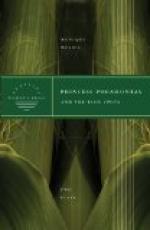This answer moved Powhatan strangely. He spoke rapidly, in words Smith could not understand, to some of the chiefs before him. Then turning to Smith again, and speaking in a tone no longer curious but cold and stern, he asked:
“How soon will ye set forth in your canoes again for your own land?”
The question Smith had dreaded must now be answered. There was danger in what he must say, yet perchance there was also the hope of soothing the fears of the savages. At all events, a lie were useless even if he had been able to tell one.
“The land is wide, oh mighty king, this land of thine, and a fair land with food enough and space aplenty for many tribes. Bethink thee of thine enemies who dwell to the north and west of thee who envy thy corn fields and thy hunting grounds. Will it not advantage thee when we, to whom thou wilt present, or perchance if it please thee better, sell a little island and a few fields on the mainland, shall join with thee and thy braves on the warpath against thy foes, and when we destroy them for thee with our guns? Let us be friends and allies, oh Powhatan. I will speak frankly, as it behooveth one to speak to a great chief, this land pleaseth us and we would gladly abide in it.”
The Englishman could not read in the expressionless face of the werowance what he was thinking of this proposition—the first attempt of the colonists to explain their presence in the Indians’ domain. But the shouting from all sides of the lodge which followed showed him that the other chiefs were strongly roused by his words. There was a long consultation: Powhatan spoke first, then a priest of many years who was listened to with great consideration, then one of the older squaws expressed her opinion, which seemed to voice that of the braves as well. Smith, knowing that his fate was being decided, tried to catch their meaning, but they spoke so rapidly that he comprehended only a phrase here and there. At last, however, Powhatan waved his hand for silence and issued a command.
It was the death sentence. Every eye was turned upon Smith. Well, they should see how an Englishman met death. He smiled as if they had brought him good news. If only his death could save the colony, it had been indeed a welcome message. Not that he did not love life, but he was one of those souls to whom an ambition, a cause, a quest, is dearer than life. And because of its very weakness, its dependence upon him, the colony had come to be like a child he must protect.
Pocahontas, when she listened to her father’s verdict, felt within her heart the same queer faintness she had experienced when Claw-of-the-Eagle was running the gauntlet. And seeing the Englishman smile, she knew him to be a brave man, and somehow felt sorry for him. She was sorry for herself also. He could have told her many new tales of lands and people, far more interesting that those of Michabo, the Great Hare. How eagerly she would have listened to him! Her father was a wise leader and he did well to fear, as she had heard him tell his chiefs, the presence in his land of these white men with their wonderful medicine; but why must he kill this leader of them, why not keep him always a prisoner?




